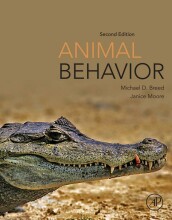Summary: Animal Behavior | 9780128016831 | Michael D Breed, et al
- This + 400k other summaries
- A unique study and practice tool
- Never study anything twice again
- Get the grades you hope for
- 100% sure, 100% understanding
Read the summary and the most important questions on Animal Behavior | 9780128016831 | Michael D. Breed; Janice Moore
-
1 Of Cockroaches and Wolves: Framing Animal Behavior
-
1.4 The Four Questions Revisited
-
What are the subjects of the 4 Tinbergen questrions?
- Mechanism
- Ontogeny (development)
- Utility
- Evolution
- Mechanism
-
1.5 Evolution: a Review
This is a preview. There are 8 more flashcards available for chapter 1.5
Show more cards here -
What are the requirements for adaptation?
- Increase survival
- Increase reproduction
- Inherited
- Increase survival
-
What is the advantage and disadvantage of sexual reproduction as an adaptation?
While sexually reproducing animals must provide twice the number of offspring found in asexually reproducing animals to be able to convey the equivalent amount of genetic information to the nezt generation, the variety among sexually produced offspring means that at least some of them may be able to survive in a changing world. -
What can cause reproductive isolation?
- Geographic barriers
- Resource shifts
- Mate choice
- Genetic change
- Geographic barriers
-
3 Behavioral Genetics
-
3.2 The Nature versus Nurture debate
This is a preview. There are 2 more flashcards available for chapter 3.2
Show more cards here -
When did the "nature" school of thought come to the forefront?
Early to mid twentieth century. -
Where did the "nurture" school of thought com to the forefront?
America, because they did a lot more laboratory testing than Europeans. -
Why is it hard to apply the nurture vs nature debate on humans?
Because people can see it as scientific ground for racism and discrimination. -
3.6 Quantitative and Biometrical Genetics (heritability only)
This is a preview. There are 9 more flashcards available for chapter 3.6
Show more cards here -
Additive genetic variation
Additive genetic variation is the proportion of genetic variation that is due to differences among alleles that sum together. -
Nonadditive genetic variation
Nonadditive genetic variation results from interactions between genes and from gene dominance. -
5 Learning
-
5.3 Basic Models for Learning
This is a preview. There are 17 more flashcards available for chapter 5.3
Show more cards here -
Trial-and-error learning
Trial-and-error learning occurs when an animal attempts a series of solutions of a problem, eliminating possible solutions that do not work.
- Higher grades + faster learning
- Never study anything twice
- 100% sure, 100% understanding































